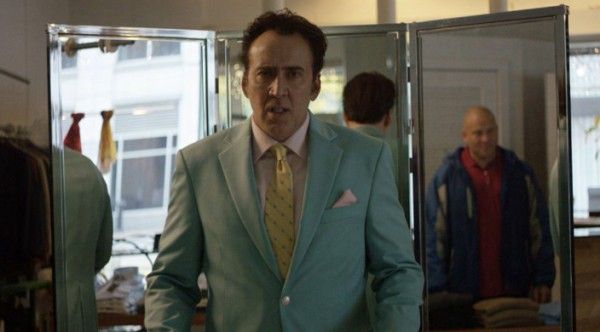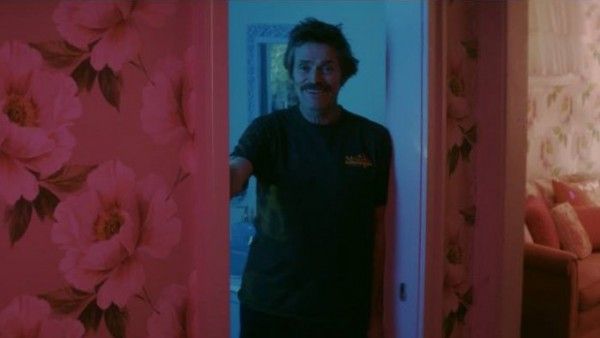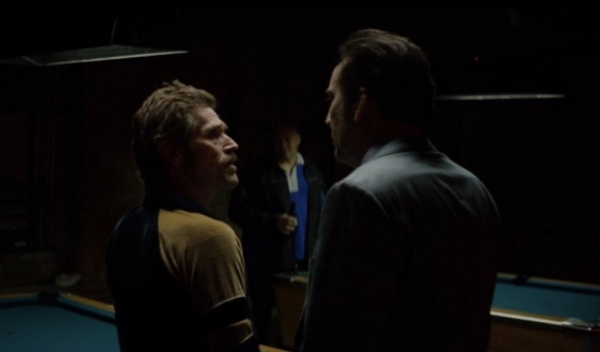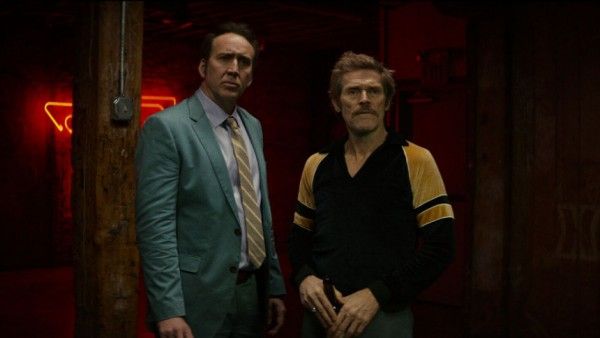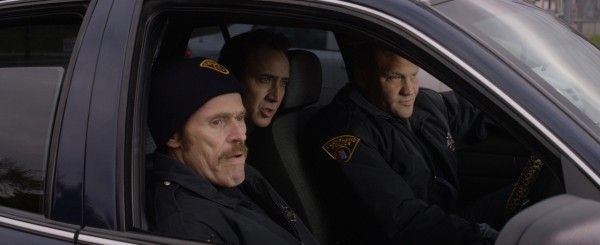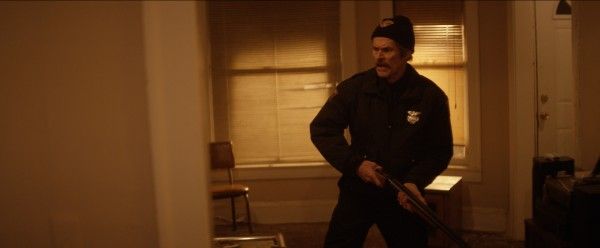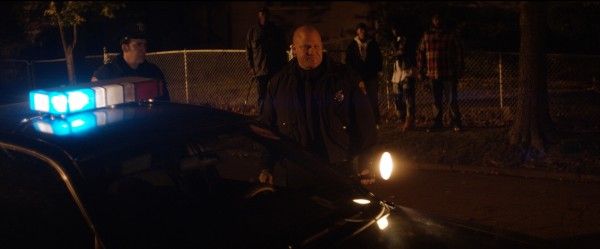American cinema is a little smarter and a hell of a lot dirtier thanks to Paul Schrader being a part of it. The man will forever be a film icon purely for writing Taxi Driver and that was just the start of his long career. He of course continued to collaborate with Martin Scorsese on Raging Bull, The Last Temptation Of Christ, and Bringing Out The Dead, where the duo turned self-destructive guilt into a viable art form. Schrader also expanded to a director in his own right with a series of impressive and diversely dark tales over the years including Blue Collar, Cat People, Mishima: A Life In Four Chapters, Affliction, and Auto Focus. The tone, style, and subjects of Schrader’s movies may change between projects, but you can always be certain that the man will turn over some dark rock in the corner of humanity and scrape off the sorry souls trapped underneath.
All of which brings us to Schrader’s latest feature Dog Eat Dog. Based on a novel by convicted bank robber and Reservoir Dogs co-star Eddie Bunker (no relation), it’s a twisted little tale of a few lowlifes who decide to kidnap a baby to keep their dirty party lifestyle afloat. In Schrader’s hands the film is a delightful bad taste comedy filled with homage to crime movies of the past and scenes that dare audiences to either laugh or immediately leave the theater. It was a make up collaboration with Nicolas Cage following the disappointing and compromised production of Dying Of The Light. This time they’ve also recruited Willem Dafoe to joint their dirty little party. So as you can imagine things get pretty wild and over the top.
The flick will only appeal to those who sense of humour is as sick as Schrader’s and as inclined towards camp as Cage. However, that specific brand of movie loving weirdo is sure to giggle along with the insanity of Dog Eat Dog in disbelief. Collider got a chance to chat up Schrader shortly before he premiered the film at this year’s Toronto International Film Festival, touching on everything from the movie’s wild humour and style to the unpredictable nature of directing the infamous Cage, and the entirely understandable reason why Schrader only worked with Richard Pryor once.
Collider: First off, this might make me a bit sick but I was pleasantly surprised by how funny and even silly the film is, which is rare for you.
PAUL SCHRADER: (Laughs) Yeah, yeah. It wasn’t written that way. But I decided to go the other way. It really started out of a bad situation on my last movie Dying Of The Light. Nic and I decided that we really wanted to work together again. So I found the script and thought that he might want to play the Mad Dog character. But I sent him the script and he decided to play the straight character, Troy, even though Mad Dog was the best role.
Then I was faced with the problem of how do you possibly make a crime movie today after Scorsese, Tarantino, Guy Ritchie, Wayne Kramer, and everybody else. That started a process of thinking about the crime film genre and watching a lot of other films. I started to realize that it was funny, even though it was never written as a comedy. So then I started thinking about an idea that was percolating over the last several years of a cinema that is post-rules. I realized that because I had final cut, and I wouldn’t have considered making the film if I didn’t after that previous experience, that I could do anything. So that began a process of putting together a group of people, mostly from outside of the film industry, to try and figure out what it even meant to make a crime film today. In the end the film is as much about crime films as it is about crime. (Laughs)
Yeah and I’d imagine if your intention was to take a crime movie that was never intended to be a comedy and turn it into one, Nicolas Cage would be an ideal partner for that sort of thing.
SCHRADER: (Laughs) Oh yes.
I’m assuming he loved that idea.
SCHRADER: Well it didn’t actually come to us right away. It grew on us. Just like the Bogart thing came slowly.
I’m assuming doing a full on Bogart impression by the end of the film was his idea? It sure felt like it.
SCHRADER: Yeah. His Bogart obsession wasn’t in the script. That was something that he was doing that I actually didn’t care much for. But I figured I’d cut it out. Why start an argument when I can just cut it out later. Then when we were coming to the end of the shoot and he was saying, “How do I play this scene at the end? I don’t understand. Why do I get away? What’s happening here?” I said, “Well, maybe you didn’t get away. Maybe this is the afterlife.” We then came to do the scene on literally the last day of shooting. We were doing a read-through on the set and he started doing it as Bogart. I said, “Nic, we don’t have time to do this twice. I’m not going to be able to change this. If you do Bogart, it will stay Bogart.” He said, “Well, you said that he might be dead. If he’s dead, he can be whoever he wants. You also said that the primary instruction for the whole film is to be bold. This is bold.” I said, “You’re right Nic. It’s bold. Let’s do it.”
I that as funny Willem Dafoe is in the film, he also ends up playing his role as a tragic character. Which is so different from Cage’s approach.
SCHRADER: Oh yeah. Well he knew what he was doing. In fact Willem contributed the funniest line in the movie. We were blocking out that scene where they take the baby and Nic was saying, “Where’s that thing you put in the baby’s mouth to keep it quiet? What do you call it?” And Willem said, “The dick?” (Laughs). We all broke up and Willem said, “I’m sorry, I’m sorry. I couldn’t say that” We just all looked at each other and said, “Why not?” It was that kind of movie.
Was it interesting to work with the two of them coming at it from such different performances styles?
SCHRADER: Yeah, yeah. It was nice to see Nic get to up his game a bit. In the world of Nic Cage, the pros and cons are that you’ll get your film financed with him in it, but he eats up most of your budget. The reason that he often doesn’t have real acting competition is because they can’t pay. But in this case ,we were able to talk Willem in. Nic gave part of his salary to Willem. So it was a chance to do a Wild At Heart reunion 20 years later. I could see during rehearsals that they were very nicely clocking each other. It was a dance. They loved it.
The movie felt like a parade of various influences and styles. It seemed like just as playful experience for you as a director behind the camera.
SCHRADER: Yeah, there were references to various movies like Requiem For A Dream and stuff like that. What I came to realize about ten years ago while I was watching a film by Xavier Dolan, Beautiful Creatures. Here’s this kid, 20 years old, and he would do a Godard scene and then a Cassavetes scene and then a Bertolucci scene and then a static scene. It didn’t really matter. The audience would put it together. As a young viewer today raised on multimedia and multi-platforming, it’s very easy to process contradictory and non-homogenous material. It used to be that every film had a unified style. Every scene had to look the same. But now you can make every scene in completely different ways. I could do one scene as cinema verite then the next as Orson Welles. Everything different. So the mantra became, just be different. Get out in front of the audience, run as fast as you can, and don’t let them catch up. Never let them know where you’re going. Zig when you’d normally zag. An example would be when I was meeting with my young team to discuss how to make all the scenes different and interesting, I mentioned that we had a strip club scene. How do we make that interesting? They’re all the fucking same. Same backlights. Same shots of girls. Same shots of money. All that. Then it occurred to me that no one had shot a strip club scene in black and white in a long time. Probably not since Lenny. So let’s just shoot it in black and white. Don’t explain why, you don’t have to explain why. You don’t’ need a reason. It’s just black and white. So that became the mindset.
I was curious why as strong a writer you haven’t tried to do television? Is that just not as interesting to you as a medium?
SCHRADER: Well, Marty [Scorsese] and I tried to do something at HBO about five or six years ago. They didn’t pick it up and that was about it. The truth is that television is a great medium for writers. But I do want to keep directing. With the kind of films I make, I couldn’t make them for television. I couldn’t make Canyons for television, I couldn’t make Dog Eat Dog for television, and I couldn’t make the film I’m doing next for television. I’ve only got a few films left in me, so I figure I’ll ride this broken horse into the sunset.
What was the show that you and Marty tried to do at HBO?
It was about post-war Tokyo.
Yakuza?
Maybe.
Ok. I heard that you might be remaking Shoot The Piano Player?
Well, someone asked me to. But that’s still just a hypothetical.
It would definitely soot this new wilder directing style.
Yeah, if that does happen. It will be even more outrageous. It will be Dog Eat Dog crossed with Umbrellas Of Cherbourg .
Well I thought the opening to Dog Eat Dog was one of the more audaciously filthy first scenes in a movie in quite some time. So I’m not sure how you could go further.
(Laughs) Yeah, when I read that scene in the script, I knew I had to direct the movie. It didn’t matter what came next. I could rewrite everything else. I wanted to do it. We had to be very bold at the beginning to tell the audience that if you’re taking this seriously, you’re in the wrong theater. So that was a real shot across the bow to try and get the non-believers out of the theater. Here’s a chance to walk out right away.
Did you ever cross paths with Eddie Bunker? It feels like you’d travel in similar circles.
Nope, never did. Willem did a film with him though. We were on separate coasts at the times we might have met.
Do you write for hire any more?
Not much. That business has kind of collapsed, in terms of the type of film that I write. There aren’t that many serious dramas. I would write for hire, but the stuff I get offered just isn’t very interesting or lucrative.
One my favorite films of yours has always been Blue Collar. I always wondered why you never worked with Richard Pryor again? It’s easily his best performance.
Well, it was a rough shoot. At the end of it, it took us almost a year or two before we even spoke. And then after that he set himself on fire. So we kind of lost touch.
Have you and Nic Cage talked about doing anything else together?
I don’t know. It would have to be something. We wanted to do this because of Dying Of The Light. We wanted to get that stain off of our clothes. Now that the stain is off, it’s a different situation. So I’m not sure. If he asked or someone asked me, I’d be interested. But I’d have to have a little bit more of a budget next time.

